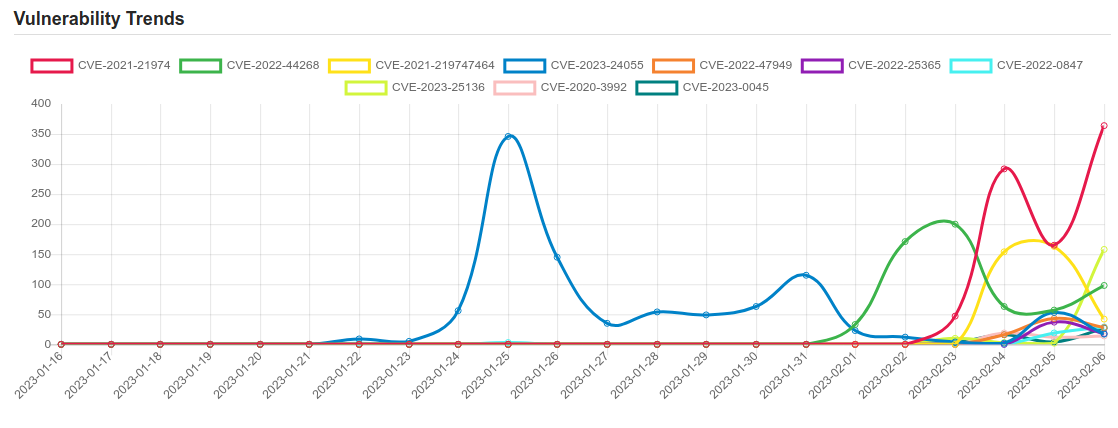Daily Vulnerability Trends: Tue Feb 07 2023

| CVE NAME | CVE Description |
| CVE-2021-27365 | An issue was discovered in the Linux kernel through 5.11.3. Certain iSCSI data structures do not have appropriate length constraints or checks, and can exceed the PAGE_SIZE value. An unprivileged user can send a Netlink message that is associated with iSCSI, and has a length up to the maximum length of a Netlink message. |
| CVE-2023-22501 | An authentication vulnerability was discovered in Jira Service Management Server and Data Center which allows an attacker to impersonate another user and gain access to a Jira Service Management instance under certain circumstances_._ With write access to a User Directory and outgoing email enabled on a Jira Service Management instance, an attacker could gain access to signup tokens sent to users with accounts that have never been logged into. Access to these tokens can be obtained in two cases: * If the attacker is included on Jira issues or requests with these users, or * If the attacker is forwarded or otherwise gains access to emails containing a “View Request” link from these users. Bot accounts are particularly susceptible to this scenario. On instances with single sign-on, external customer accounts can be affected in projects where anyone can create their own account. |
| CVE-2022-44267 | ImageMagick 7.1.0-49 is vulnerable to Denial of Service. When it parses a PNG image (e.g., for resize), the convert process could be left waiting for stdin input. |
| CVE-2023-20076 | No description provided |
| CVE-2022-31704 | The vRealize Log Insight contains a broken access control vulnerability. An unauthenticated malicious actor can remotely inject code into sensitive files of an impacted appliance which can result in remote code execution. |
| CVE-2022-27596 | A vulnerability has been reported to affect QNAP device running QuTS hero, QTS. If exploited, this vulnerability allows remote attackers to inject malicious code. We have already fixed this vulnerability in the following versions of QuTS hero, QTS: QuTS hero h5.0.1.2248 build 20221215 and later QTS 5.0.1.2234 build 20221201 and later |
| CVE-2023-21608 | Adobe Acrobat Reader versions 22.003.20282 (and earlier), 22.003.20281 (and earlier) and 20.005.30418 (and earlier) are affected by a Use After Free vulnerability that could result in arbitrary code execution in the context of the current user. Exploitation of this issue requires user interaction in that a victim must open a malicious file. |
| CVE-2022-31706 | The vRealize Log Insight contains a Directory Traversal Vulnerability. An unauthenticated, malicious actor can inject files into the operating system of an impacted appliance which can result in remote code execution. |
| CVE-2021-31985 | Microsoft Defender Remote Code Execution Vulnerability |
| CVE-2021-3156 | Sudo before 1.9.5p2 contains an off-by-one error that can result in a heap-based buffer overflow, which allows privilege escalation to root via “sudoedit -s” and a command-line argument that ends with a single backslash character. |
| CVE-2021-21974 | OpenSLP as used in ESXi (7.0 before ESXi70U1c-17325551, 6.7 before ESXi670-202102401-SG, 6.5 before ESXi650-202102101-SG) has a heap-overflow vulnerability. A malicious actor residing within the same network segment as ESXi who has access to port 427 may be able to trigger the heap-overflow issue in OpenSLP service resulting in remote code execution. |
| CVE-2022-44268 | ImageMagick 7.1.0-49 is vulnerable to Information Disclosure. When it parses a PNG image (e.g., for resize), the resulting image could have embedded the content of an arbitrary. file (if the magick binary has permissions to read it). |
| CVE-2021-219747464 | No description provided |
| CVE-2023-24055 | ** DISPUTED ** KeePass through 2.53 (in a default installation) allows an attacker, who has write access to the XML configuration file, to obtain the cleartext passwords by adding an export trigger. NOTE: the vendor’s position is that the password database is not intended to be secure against an attacker who has that level of access to the local PC. |
| CVE-2022-47949 | The Nintendo NetworkBuffer class, as used in Animal Crossing: New Horizons before 2.0.6 and other products, allows remote attackers to execute arbitrary code via a large UDP packet that causes a buffer overflow, aka ENLBufferPwn. The victim must join a game session with the attacker. Other affected products include Mario Kart 7 before 1.2, Mario Kart 8, Mario Kart 8 Deluxe before 2.1.0, ARMS before 5.4.1, Splatoon, Splatoon 2 before 5.5.1, Splatoon 3 before late 2022, Super Mario Maker 2 before 3.0.2, and Nintendo Switch Sports before late 2022. |
A considerable amount of time and effort goes into maintaining this website, creating backend automation and creating new features and content for you to make actionable intelligence decisions. Everyone that supports the site helps enable new functionality.
If you like the site, please support us on Patreon using the button below

To keep up to date follow us on the below channels.





